Talking fuel
Page 22
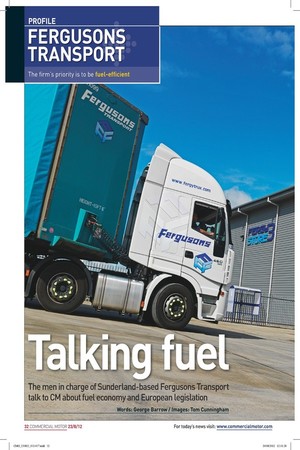
Page 24
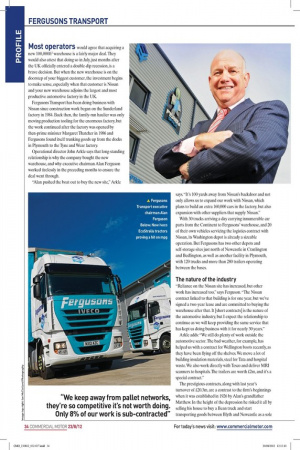
Page 25
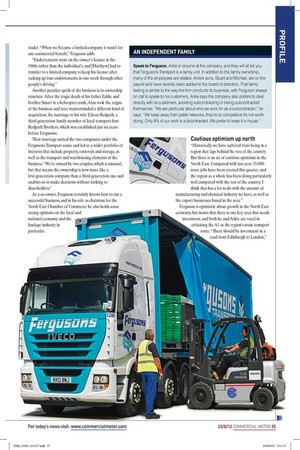
Page 26
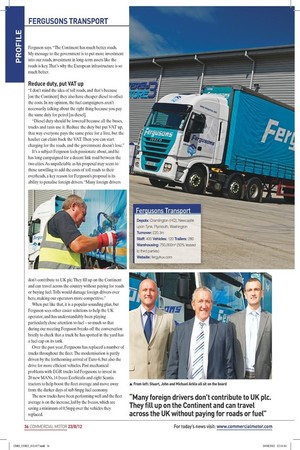
Page 27
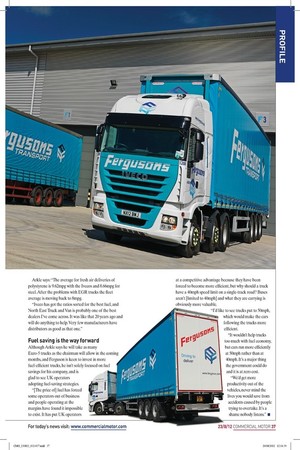
If you've noticed an error in this article please click here to report it so we can fix it.
The men in charge of Sunderland-based Fergusons Transport talk to CM about fuel economy and European legislation
Words: George Barrow / Images: Tom Cunningham Most operators would agree that acquiring a new 100,000ft2 warehouse is a fairly major deal. They would also attest that doing so in July, just months after the UK officially entered a double-dip recession, is a brave decision. But when the new warehouse is on the doorstep of your biggest customer, the investment begins to make sense, especially when that customer is Nissan and your new warehouse adjoins the largest and most productive automotive factory in the UK.
Fergusons Transport has been doing business with Nissan since construction work began on the Sunderland factory in 1984. Back then, the family-run haulier was only moving production tooling for the enormous factory, but the work continued after the factory was opened by then-prime minister Margaret Thatcher in 1986 and Fergusons found itself trunking goods up from the docks in Plymouth to the Tyne and Wear factory.
Operational director John Arkle says that long-standing relationship is why the company bought the new warehouse, and why executive chairman Alan Ferguson worked tirelessly in the preceding months to ensure the deal went through.
“Alan pushed the boat out to buy the new site,” Arkle says. “It’s 100 yards away from Nissan’s backdoor and not only allows us to expand our work with Nissan, which plans to build an extra 160,000 cars in the factory, but also expansion with other suppliers that supply Nissan.” With 30 trucks arriving a day carrying innumerable car parts from the Continent to Fergusons’ warehouse, and 20 of their own vehicles servicing the logistics contract with Nissan, its Washington depot is already a sizeable operation. But Fergusons has two other depots and self-storage sites just north of Newcastle in Cranlington and Bedlington, as well as another facility in Plymouth, with 120 trucks and more than 280 trailers operating between the bases.
The nature of the industry
“Reliance on the Nissan site has increased, but other work has increased too,” says Ferguson. “The Nissan contract linked to that building is for one year, but we’ve signed a two-year lease and are committed to buying the warehouse after that. It [short contracts] is the nature of the automotive industry, but I expect the relationship to continue as we will keep providing the same service that has kept us doing business with it for nearly 30 years.” Arkle adds: “We still do plenty of work outside the automotive sector. The bad weather, for example, has helped us with a contract for Wellington boots recently, as they have been flying off the shelves. We move a lot of building insulation materials, steel for Tata and hospital waste. We also work directly with Tesco and deliver MRI scanners to hospitals. The trailers are worth £2m, and it’s a special contract.” The prestigious contracts, along with last year’s turnover of £20.3m, are a contrast to the firm’s beginnings when it was established in 1926 by Alan’s grandfather Matthew. In the height of the depression he risked it all by selling his house to buy a Bean truck and start transporting goods between Blyth and Newcastle as a sole trader. “When we became a limited company it wasn’t for any commercial benefit,” Ferguson adds.
“Endorsements went on the owner’s licence in the 1960s rather than the individual’s, and [Matthew] had to transfer to a limited company to keep his licence after racking up four endorsements in one week through other people’s driving.” Another peculiar quirk of the business is its ownership structure. After the tragic death of his father Eddie and brother Stuart in a helicopter crash, Alan took the reigns of the business and later masterminded a different kind of acquisition, the marriage to his wife Eileen Redpath, a third-generation family member of local transport firm Redpath Brothers, which was established just six years before Fergusons.
Their marriage united the two companies under the Fergusons Transport name and led to a wider portfolio of interests that include property, removals and storage, as well as the transport and warehousing elements of the business. “We’re owned by two couples, which is unusual, but that means the ownership is now more like a first-generation company than a third-generation one and enables us to make decisions without looking to shareholders.” As a co-owner, Ferguson certainly knows how to run a successful business, and in his role as chairman for the North East Chamber of Commerce he also holds some strong opinions on the local and national economy and the haulage industry in particular.
Cautious optimism up north
“Historically we have suffered from being in a region that lags behind the rest of the country. But there is an air of cautious optimism in the North East. Compared with last year, 55,000 more jobs have been created this quarter, and the region as a whole has been doing particularly well compared with the rest of the country. I think that has a lot to do with the amount of manufacturing and chemical industry we have, as well as the export businesses based in the area.” Ferguson is optimistic about growth in the North East economy, but insists that there is one key area that needs investment, and both he and Arkle are vocal in criticising the A1 as the region’s main transport route. “There should be investment in a road from Edinburgh to London,” Ferguson says. “The Continent has much better roads. My message to the government is to put more investment into our roads, investment in long-term assets like the roads is key. That’s why the European infrastructure is so much better.
Reduce duty, put VAT up
“I don’t mind the idea of toll roads, and that’s because [on the Continent] they also have cheaper diesel to offset the costs. In my opinion, the fuel campaigners aren’t necessarily talking about the right thing because you pay the same duty for petrol [as diesel].
“Diesel duty should be lowered because all the buses, trucks and taxis use it. Reduce the duty but put VAT up, that way everyone pays the same price for a litre, but the haulier can claim back the VAT. Then you can start charging for the roads, and the government doesn’t lose.” It’s a subject Ferguson feels passionate about, and he has long campaigned for a decent link road between the two cities. As unpalletable as his proposal may seem to those unwilling to add the costs of toll roads to their overheads, a key reason for Ferguson’s proposal is its ability to penalise foreign drivers. “Many foreign drivers don’t contribute to UK plc. They fill up on the Continent and can travel across the country without paying for roads or buying fuel. Tolls would damage foreign drivers over here, making our operators more competitive.” When put like that, it is a popular-sounding plan, but Ferguson sees other easier solutions to help the UK operator, and has understandably been playing particularly close attention to fuel – so much so that during our meeting Ferguson breaks off the conversation briefly to check that a truck he has spotted in the yard has a fuel cap on its tank.
Over the past year, Fergusons has replaced a number of trucks throughout the fleet. The modernisation is partly driven by the forthcoming arrival of Euro-6, but also the drive for more efficient vehicles. Past mechanical problems with EGR trucks led Fergusons to invest in 20 new MANs, 14 Iveco EcoStralis and eight Scania tractors to help boost the fleet average and move away from the darker days of sub 8mpg fuel economy.
The new trucks have been performing well and the fleet average is on the increase, led by the Ivecos, which are saving a minimum of 0.5mpg over the vehicles they replaced. Arkle says: “The average for fresh air deliveries of polystyrene is 9.62mpg with the Ivecos and 8.66mpg for steel. After the problems with EGR trucks the fleet average is moving back to 8mpg.
“Iveco has got the ratios sorted for the best fuel, and North East Truck and Van is probably one of the best dealers I’ve come across. It was like that 20 years ago and will do anything to help. Very few manufacturers have distributors as good as that one.”
Fuel saving is the way forward
Although Arkle says he will take as many Euro-5 trucks as the chairman will allow in the coming months, and Ferguson is keen to invest in more fuel-efficient trucks, he isn’t solely focused on fuel savings for his company, and is glad to see UK operators adopting fuel-saving strategies.
“[The price of] fuel has forced some operators out of business and people operating at the margins have found it impossible to exist. It has put UK operators at a competitive advantage because they have been forced to become more efficient, but why should a truck have a 40mph speed limit on a single-track road? Buses aren’t [limited to 40mph] and what they are carrying is obviously more valuable.
“I’d like to see trucks put to 50mph, which would make the cars following the trucks more efficient.
“It wouldn’t help trucks too much with fuel economy, but cars run more efficiently at 50mph rather than at 40mph. It’s a major thing the government could do and it is at zero cost.
“We’d get more productivity out of the vehicles, never mind the lives you would save from accidents caused by people trying to overtake. It’s a shame nobody listens.” ■








































